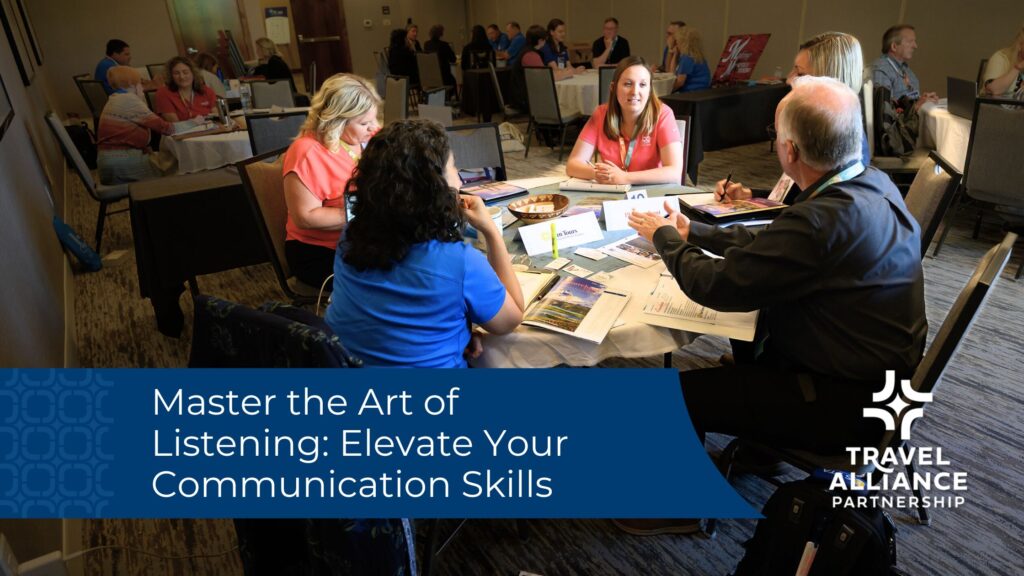Master the Art of Listening: Elevate Your Communication Skills
In today’s digital age, we often find ourselves communicating through emails, texts, and social media posts. While these methods are convenient, they lack the depth of face-to-face conversations. How often do you engage in meaningful, in-person dialogues? More importantly, how effective are you at listening during these interactions? In our fast-paced world, much of our communication has become one-sided. People are quick to share their thoughts but often fail to listen actively. Real understanding comes from listening, not just talking. Elevate your communication skills with these active listening tips.

Why Listening Matters
Listening is crucial for effective communication. It helps build stronger relationships, fosters understanding, and resolves conflicts more efficiently. For tourism industry professionals, effective listening skills are essential for many instances, including creating successful collaborations and maximizing the benefits of attending travel tradeshows.
Effective Listening Skills Are Important for Successful Collaborations
Listening skills are essential for successful collaborations because they help build trust, respect, and understanding among team members. Being fully present in conversations allows individuals to engage genuinely, which fosters a collaborative environment where everyone feels heard and valued. Effective listening also involves using high-gain questions to draw out deeper insights, acknowledging others’ contributions, and addressing disagreements constructively. This enhances overall communication, making it easier to pitch ideas, gain buy-in, and work through conflicts, ultimately leading to more productive and harmonious teamwork.
Learn more about listening and presentation skills for collaborations. Go further with listening and presence skills in Episode 230, “Supercharge your Executive Presence,” with Carol Lempert.
Maximizing Your Tradeshow Experience Through Effective Listening and Communication Skills
Effective listening and communication skills are vital for maximizing the benefits of attending travel tradeshows. These skills enable meaningful engagement with buyers and suppliers as well as potential partners. By being an attentive listener, you can gather valuable insights, uncovering opportunities that might otherwise be missed. Additionally, clear and confident communication allows you to articulate your objectives and pitch your ideas effectively, fostering stronger connections and collaborations. This enhances your ability to network, negotiate deals, and gain strategic information, ultimately making your tradeshow experience more productive and impactful.
10 Tips to Enhance Listening Skills and Become a Better Communicator
- Maintain Eye Contact. Face the person speaking and maintain eye contact to show that you are fully engaged.
- Eliminate Distractions. Avoid looking at your phone or letting your attention wander. Stay focused on the conversation.
- Be Attentive. Pay close attention to the speaker’s body language and physical demeanor. Mirroring their behavior can make them feel more comfortable.
- Keep an Open Mind. Listen without judgment. Even if you hear something you disagree with, stay open to understanding their perspective.
- Visualize the Conversation. Create a mental image of what the speaker is saying. This can help you better understand and remember the conversation.
- Hold Off on Solutions. Sometimes, people just need to be heard. Recognize when to offer advice and when to simply listen.
- Ask Thoughtful Questions. Show your interest by asking questions. This demonstrates that you are engaged and curious about what they are saying.
- Pause Before Responding. Avoid interrupting. Wait for a natural pause before you speak to ensure the other person feels heard.
- Respond to Emotions. Pay attention to the emotional tone of the conversation. React appropriately to show empathy and understanding.
- Provide Feedback. Reflect on the speaker’s feelings and give feedback. Phrases like “You must be so excited!” or “That sounds challenging” can validate their experience.
The Power of Nonverbal Communication
Nonverbal cues such as tone of voice, facial expressions, and body language are essential components of effective communication. They can sometimes convey more than words themselves. By paying attention to these signals, you can gain a deeper understanding of the speaker’s true message.
Overall
Improving your listening skills can significantly enhance your communication abilities. By following these tips, you can become a more effective listener and a better communicator in general.
Author
Related Posts
Communication: The 3 C’s of World-Changing Collaborations
Big ideas and big achievements don’t happen alone. They require teamwork and a shared goal. That’s why collaboration is essential, especially in the travel and…
Building Belonging in Tourism Marketing
The days of relying on glossy brochures and catchy taglines to attract travelers are behind us. Today, what truly resonates with visitors isn’t a brand’s…
